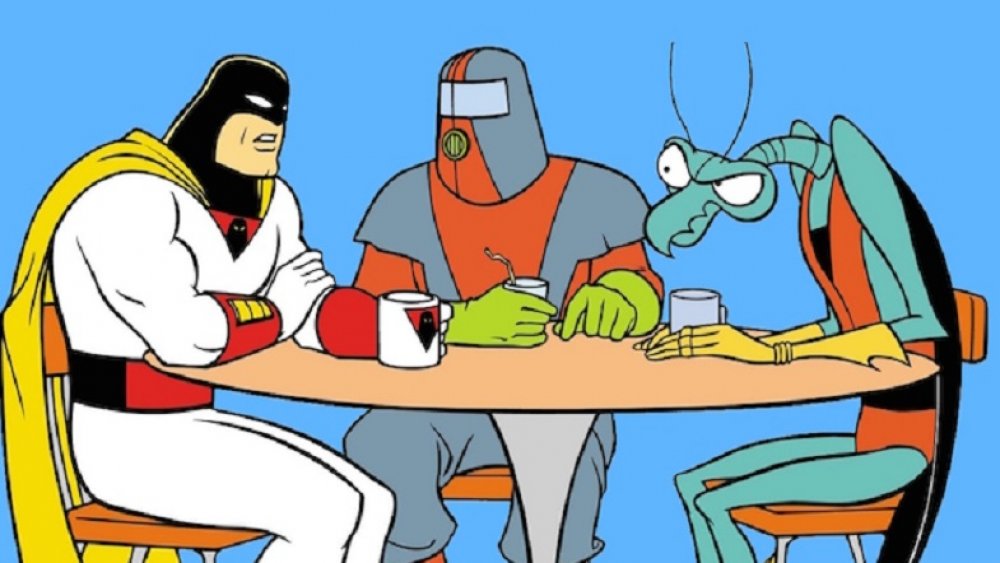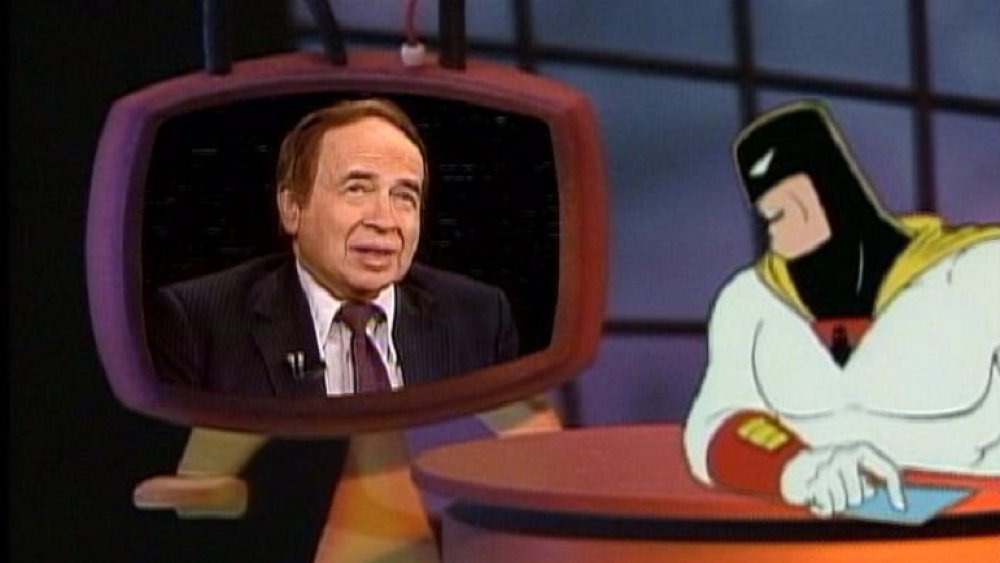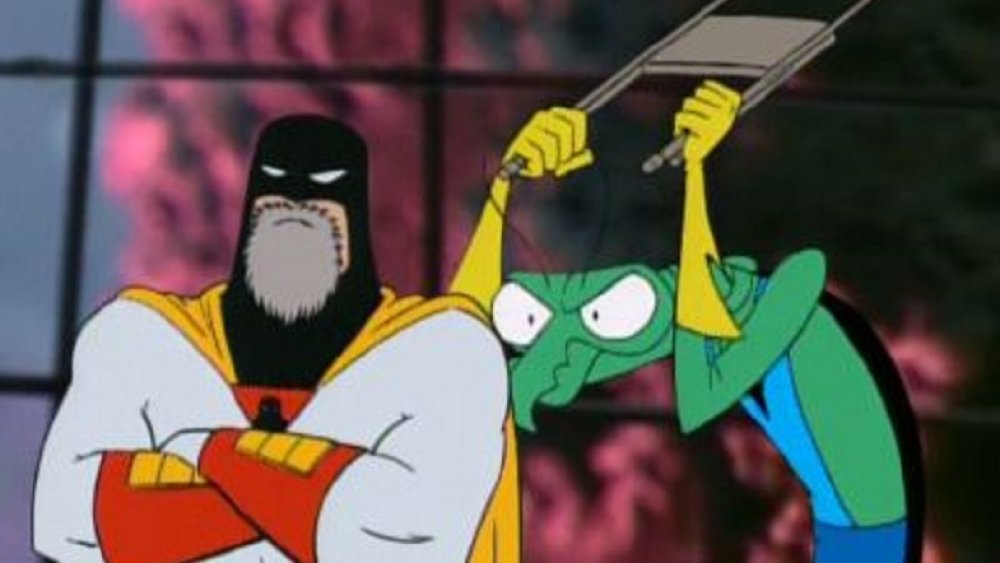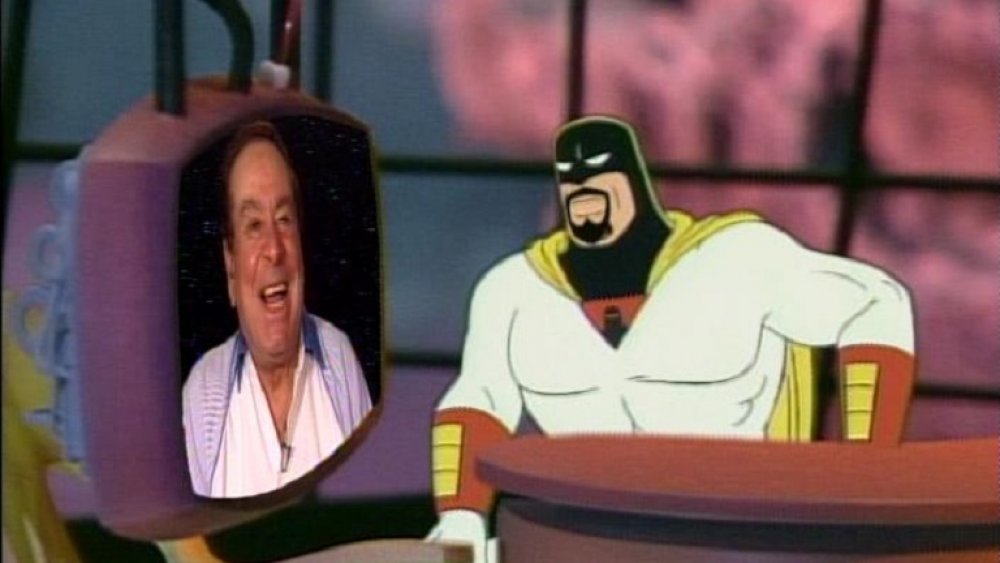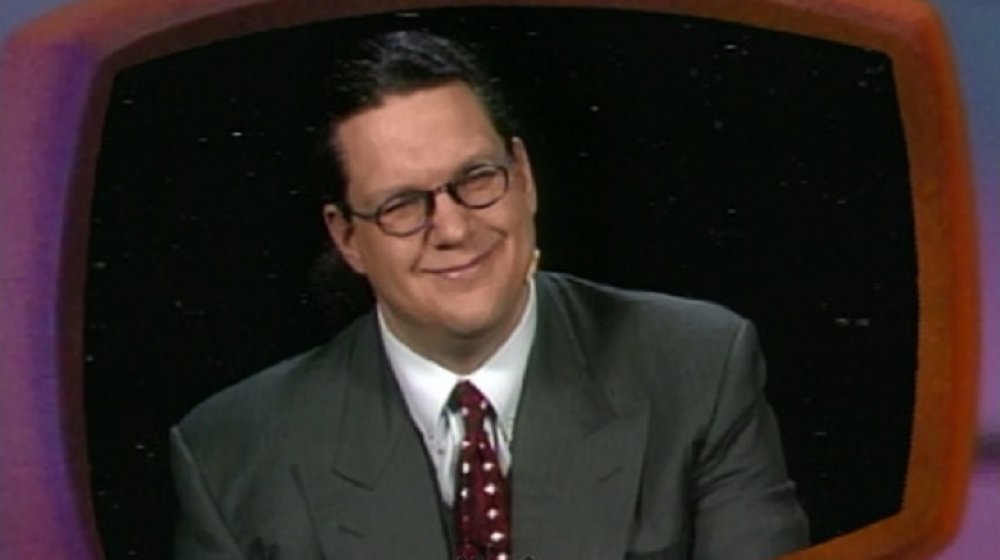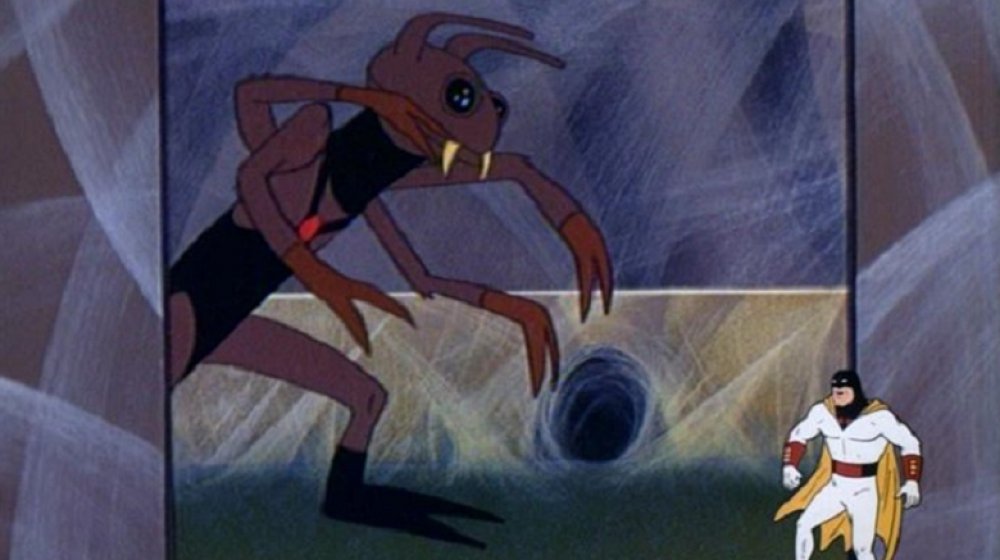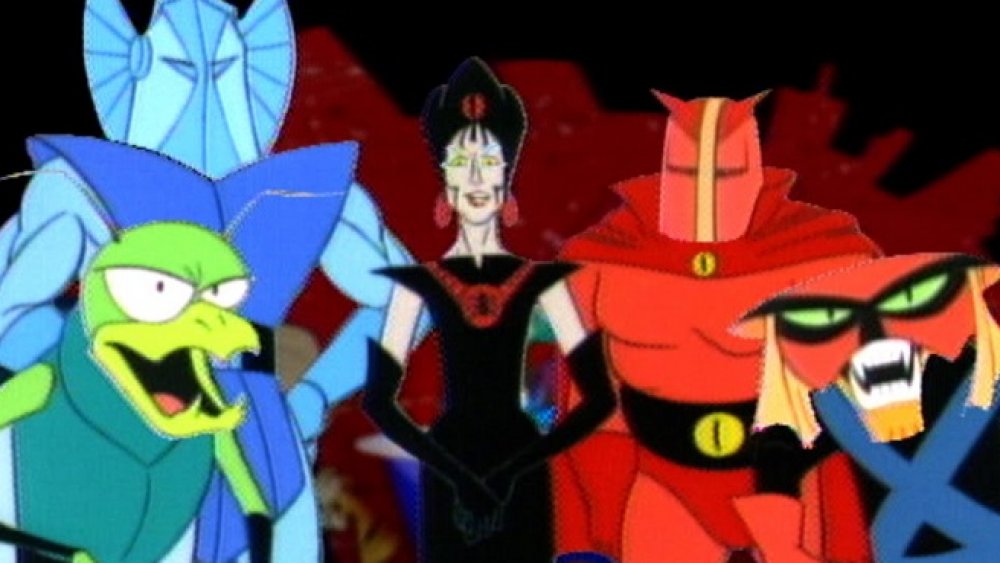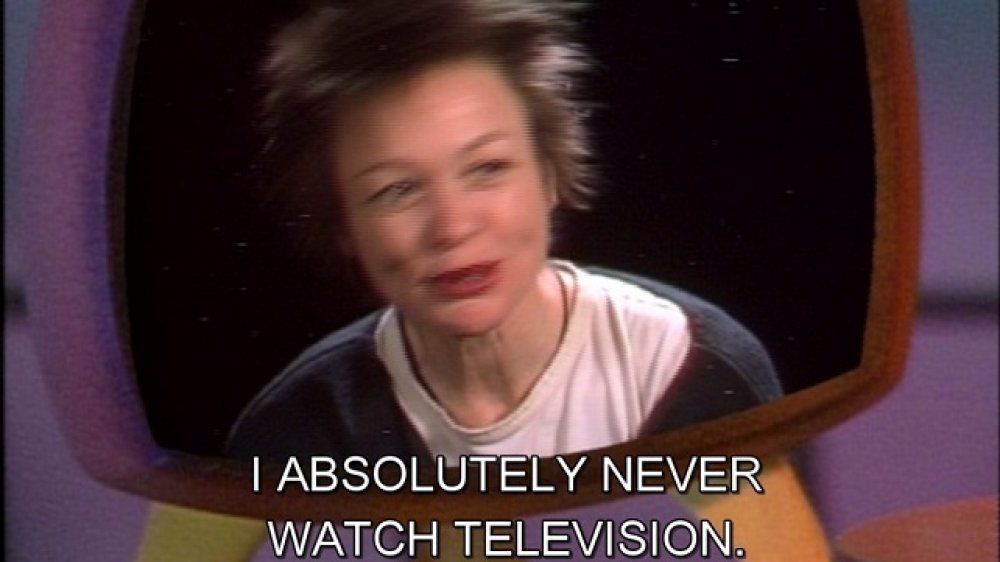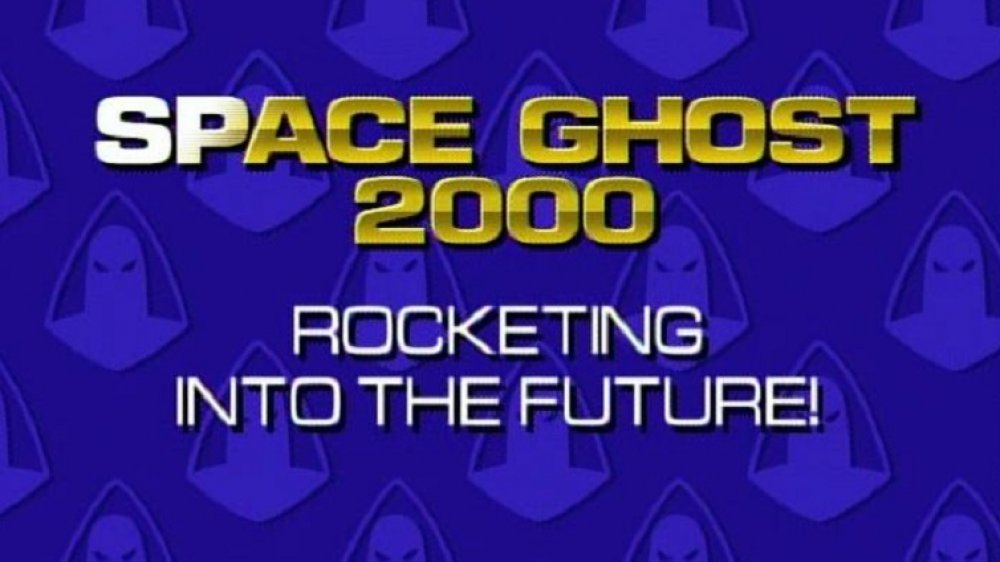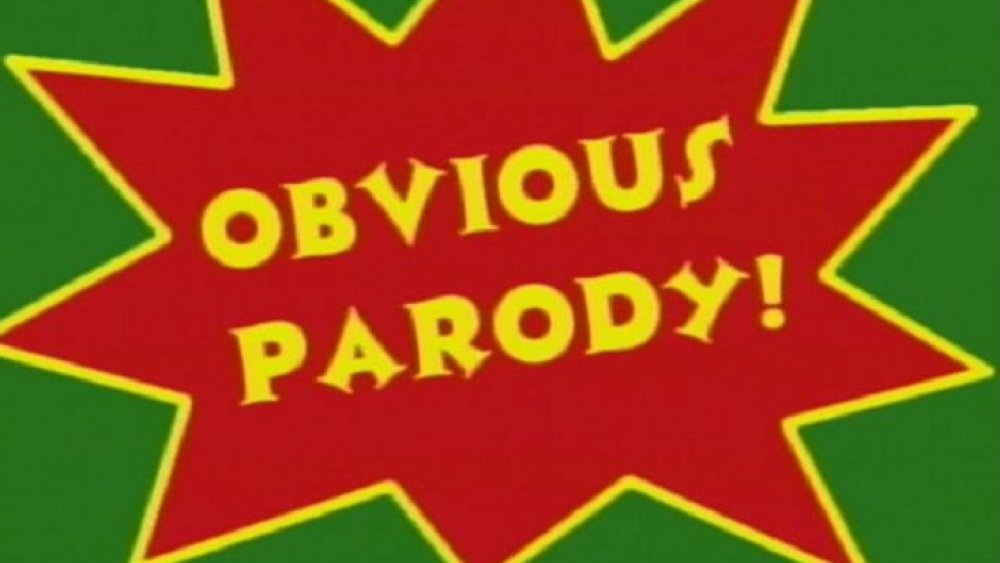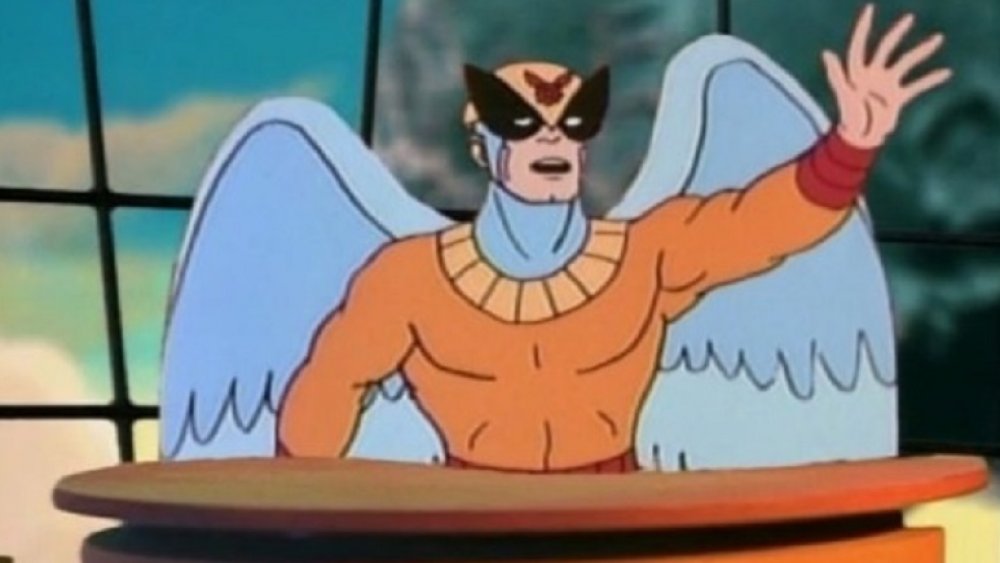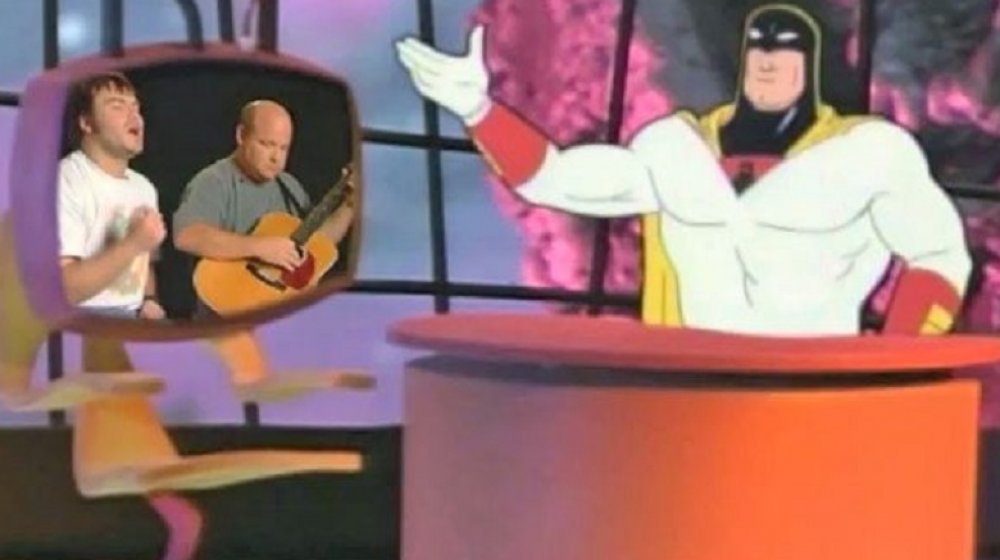Bizarre Things In Space Ghost Coast To Coast
Debuting April 15th, 1994 on Cartoon Network, Space Ghost Coast To Coast proved to be a huge influence on animation, comedy, and television of the new millennium. Packaged as a parody of late-night television talk shows, it re-purposed old footage from the 1960s Space Ghost animated superhero show (designed by cartooning legend Alex Toth) and mixed it with live-action interviews. Eventually, it spawned the hugely successful Adult Swim animation bloc that endures to this day.
Rather than act as a heroic figure, Space Ghost is vain, stupid, insecure, narcissistic, and possessed of a hair-trigger temper. That temper often means turning his Destructo-Ray on his two "employees": bandleader Zorak (an anthropomorphic mantis) and director Moltar (a lava man held together by a containment suit). Both are former villains turned slaves of Space Ghost, and both make merciless fun of him. The show broadcasts from the Ghost Planet, its celebrity guests present via screen for interviews. Space Ghost, clueless, often asks them if they're getting enough oxygen.
All of this would have been silly enough, but the show goes for maximum weirdness in all things: Subjects are asked nonsensical questions, their answers edited into total insanity. The result is glorious chaos, especially in the show's later seasons, which veer into outright surrealism. From giant ants to meta-fictional mayhem, these are the most bizarre elements of Space Ghost Coast to Coast.
The Late Night Wars
Space Ghost Coast To Coast debuted a couple of years after what were dubbed "The Late Night Wars," the struggle between Jay Leno and David Letterman to determine who would replace Johnny Carson as host of the late-night institution The Tonight Show. In season one episode "CHIPS," Space Ghost comments on the conflict, remarking that he doesn't remember Leno or Letterman as superheroes, but he does remember Conan O'Brien, noting that "he had wit and muscle." That's only the most overt nod to the legendary TV struggle, however — subtler nods to it are all over Space Ghost.
Take the titular host himself. Space Ghost is, in some ways, a more outlandish version of Letterman — his mannerisms, like tapping a card on his desk and laughing inappropriately, are especially reminiscent. It also extends to their willingness to deconstruct the traditional talk show formula and dismiss the importance of celebrity culture. While Letterman is in on the joke, Space Ghost is blissfully clueless — an obliviousness that is the backbone of the show.
Hammering the comparison home even further, season three's "Late Show" is practically a shot-for-shot parody of an average episode of Late Show With David Letterman, mimicking the announcer's lead-in, the camera-led tour of the studio, and even Zorak as the obsequious Paul Shaffer. The episode was written by former Letterman writers Steve O'Donnell and Spike Feresten, who clearly had a blast highlighting the similarities between their former host and the animated one.
Wrestling, Space Ghost-style
Cartoon Network's sister network TNT ran the popular Monday Night Nitro wrestling show back in the 1990s, so naturally, Hulk Hogan made a 1995 appearance in Space Ghost's season two episode, "Sleeper." Space Ghost mocks Hogan's new TV show after the Hulkster mocks his waistline. The whole segment is a clever skewering of Hogan's persona by way of Space Ghost's own fixation on being muscular.
Season four's "Piledriver" features Grandpa Space Ghost, aka Leonard Ghostal, voiced by the glorious "Macho Man" Randy Savage. Grandpa makes constant references to having wrestled Moltar's dad and asks Raven Symone if she "ever got the thrill of slinging one of your little school chums into the mat and watching their eyes roll back in their head."
Later, Zorak (whom Grandpa mistakes for Blip, Space Ghost's old monkey sidekick) sneaks up behind Grandpa with a steel chair and whacks him. Moltar provides commentary like an old-school wrestling announcer. With his trademark "oooh, YEAH, " Savage somehow makes Grandpa a totally believable (if ridiculous) character, as he goes on and on about fighting Gorgeous George, Haystacks Calhoun, and "Wildfire" Tommy Rich. The episode nails every old-school wrestling trope while providing a spotlight for Savage's gravelly, enthusiastic, and familiar voice. Of course, it ends with Grandpa going off in a flying saucer with a guy who threatened to kick Space Ghost's butt — but hey, wrestling's all about the chase.
Hipsters abound!
Frequent guest Bobcat Goldthwait reveals that Space Ghost's true identity is Tad Ghostal in season one. Tad's evil twin brother Chad menaces the set in season three, threatening to replace him — an event that comes to pass in season four's "Hipster." Like most evil twins, Chad is notable for his Van Dyck beard. Unlike most evil twins, but like many 90s hipsters, Chad is obsessed with swing music and being cool, daddio! The buttons on his power bands include an "atomic drink mixer" and a "deluxe chick magnet." His reign is, without question, one of the weirdest things Space Ghost ever did.
Chad's guests include The Millionaire from 90s jazz-lounge band Combustible Edison, who gives him advice about being hip, although Zorak and Moltar claim he looks like a Batman villain. The real treat on this episode, however, is sax legend Sam Butera, whose work with Louis Prima in the 1950s truly swings hard. While the Millionaire's tongue is firmly in cheek, Butera's advice on being hip, getting chicks ("a little jive talk...you gotta call her baby, sweetheart"), and his anger at David Lee Roth for not paying him for his use of "Just A Gigolo" all feels very real. When the cops arrive to arrest Chad, he sings "It's Been A Blast" and then blasts Zorak on his way out.
I'm afraid I can't do that, Tad
In this parody of 2001: A Space Odyssey, Space Ghost is initially elated when he installs the MOE 2000 computer to run the show, especially since it means he can fire Moltar and Zorak. MOE doesn't ever sleep or eat, nor will it book troublesome guests like The Bee Gees. A disgruntled Moltar goes to the commissary and eats birthday cake from a buffet ("comes with a small Fresca") while Zorak discusses his seafood diet ("When I see food, I hate Space Ghost!").
Things don't go as smoothly as Space Ghost wishes, as he struggles with Penn Jillette and then the completely silent Teller. When he complains that MOE doesn't laugh at his jokes, the computer sagely notes that Space Ghost didn't tell any. MOE turns against his boss when Space Ghost starts to bully Joel Hodgson of Mystery Science Theater 3000 fame. Space Ghost demonstrates his Destructo, Freeze, Smell, and Spank rays before MOE has enough and fires him. Space Ghost, in turn, destroys him, but the Ghost Planet falls into a 2001-style space warp. Zorak is reborn outside the Ghost Planet and says, "Look at me, I'm a space baby!" Thus ends one of the weirdest Kubrick parodies ever made.
Anti-comedy a la ant
Space Ghost Coast To Coast takes a special delight in antagonizing its viewers. This is true in many episodes, but is brought to a crescendo in season six's "Fire Ant." After an agonizing trumpet introduction for guest Conan O'Brien that lasts 45 seconds, Space Ghost sets himself on fire out of outrage at The WB for not picking up his new show idea. The interview with Conan grows increasingly belligerent as they trade insults. Finally, Space Ghost loses interest and follows a tiny ant across the Ghost Planet for a good ten minutes of screen time, intent on killing its whole family. During this "chase," there are no jokes, no dialogue, nothing. Just Space Ghost following an ant with no end in sight, like the most painful, protracted, shaggy dog joke ever. Finally, he reaches its home and is attacked by the ant's monstrous parent.
The show, which usually occupied a 15-minute slot, bursts right through that restriction. Watched live, no one knew how far the show would take this painful bit of nonsense. When the show was repeated on the Cartoon Network, a shorter version was used. This wasn't just gutsy, bizarre, and utterly unprecedented, but can today be appreciated as the sort of thing that made Tim and Eric, The Eric Andre Show, and all other Adult Swim weirdness possible.
A multitude of metacommentary
Space Ghost Coast To Coast was pretty meta to begin with, constantly winking at its corny 60s roots. Season two begins with a "world premiere toon-in" that stretches meta to its limit, featuring interviews with the directors of several new Cartoon Network shows. Former Space Ghost villains The Council of Doom act as judges, and the show introduces the world to the brilliance of Brak, the shouty catlike villain who would be given his own show, The Brak Show Starring Brak, when Adult Swim premiered several years later.
No one is spared, no matter how impressive. Genndy Tartakovsky, who was then unveiling Dexter's Laboratory and would go on to create Samurai Jack, Star Wars: The Clone Wars, and Primal, is referred to as "Ginsu."Craig McCracken, debuting The Powerpuff Girls, is told to get a haircut. In the end, McCracken wins the swimsuit competition.
But that's nothing compared to the metacommentary of season two episode "Story Book." Instead of any of the usual trappings of the show, we are introduced to Kirk the Storyteller, who narrates older episodes from a fancy chair. His friend, Carl the Cartoonist, draws images from the episodes with children watching him. Like many of the show's experiments, it's done completely straight-faced.
Space Ghost goes punk
For an oddball cartoon, Space Ghost Coast To Coast manages to showcase a whole lot of punk, new wave, and alternative musicians. When the Ramones appear in the first season, Zorak is excited (he claims to be Zorak Ramone), but Space Ghost thinks they are "a bunch of punks." The Ramones have the last laugh, as they eat Space Ghost's party cake — though they do make up a zippy little song for him.
Alternative musicians who appear following this opening salvo of weirdness end up in even more surreal situations. Michael Stipe, wearing oversized sunglasses, declares that it is indeed him in the corner. David Byrne gets into an argument with Space Ghost regarding the use of croutons in salad. Matthew Sweet tells a story about beer bottles while Space Ghost accompanies on the harmonica. Before talking to Laurie Anderson, Space Ghost declares that "art and TV don't mix." She tells him that she never watches TV. Things don't go well, as Space Ghost turns invisible and she starts talking about cyberspace and the gold standard. Sonic Youth's Thurston Moore poses as "Fred Cracklin" in an episode that pays tribute to jazz guitarist Sonny Sharrock, the composer of the show's theme song. Beck falls asleep during his interview, and Pavement replaces Zorak's band in one episode. No matter how respected, boundary-pushing, or influential, no avant-garde artist was safe on Space Ghost.
Playing with TV conventions
Space Ghost delights in remixing, blowing up, and otherwise screwing with TV conventions. Season four episode "Pilot," for example, reveals the "secret" that the network originally hired avian superhero Birdman to be the host of their new late-night talk show. In addition to somehow being even more socially awkward than Space Ghost, Birdman's powers are dependent upon the sun, which makes him spectacularly ill-suited to host a late-night talk show. "Rehearsal" goes even deeper into the show's fictional development, detailing the dress rehearsal two days prior to the very first episode of the show. This one gets into the minutiae of what goes into a show, from special effects problems (Zorak keeps getting blown up at random) to an overbearing director asking for more energy. Zorak asks for his lines and then wonders about his motivation. Fred Schneider of the B-52s laughs off Space Ghost threatening him with an aerosol ray after he reveals that he has "super B.O."
Season five's "Joshua" takes it further, being "not for public broadcast" as it's one long, weird infomercial for the "Space Ghost 2000" brand. Space Ghost is your "space-age packhorse" for advertising, it pleads, as it drowns the viewer in advertising buzzwords, random references, and utter nonsense.
And then are the two episodes of "Mommentary." In its first iteration, the three Space Ghost producers' moms comment on an episode of the show. In the second iteration, the producers comment on their mothers' commentary. Does that make it meta-meta?
60s And 70s kitsch
The 90s featured a lot of nostalgia for 60s and 70s kitsch. Aging stars looking to promote their books or latest revival tour went on Space Ghost Coast To Coast, expecting a straightforward nostalgia trip, heedless of what fate awaited them. The first season in particular is thick with these sorts of guests. "Gilligan," for example, features several former cast members of Gilligan's Island, in which "The Professor" Russell Johnson mocks poor Space Ghost.
Former child stars Danny Bonaduce and Donny Osmond snipe about each other and their infamous 90s boxing match in separate episodes. A confused Timothy Leary pops up briefly in another episode. Bill "Lost In Space" Mumy and Mark Hamill show up as the guests of the Ghost Planet-hosted "Sci Fi Con 1997." A snubbed Space Ghost refuses to talk to Mumy, but takes a shine to Hamil, whom he refers to as "Luke Skytopper" and hires as a new sidekick.
Of course, the ultimate in 60s shtick is Batman, and the episode with Adam West, Eartha Kitt, and Lee Meriweather does not disappoint. A villain named "Your Mother" kidnaps Moltar, and Space Ghost teams up with the transformed Batmantis in search of her. They punch things and sound effects like "Obvious Parody!" appear on the screen. Space Ghost questions the former TV stars and asks for their help before dismissing them, with West getting a cold "Adam, see you at the auto show."
Ghosts from the past
Series writers Evan Dorkin and Sarah Dyer took special pleasure in creating a backstory for Space Ghost, while making him look as awful as possible in the process. Consider "Lawsuit", in which his former teen partners Jan and Jace, sue him for emotional cruelty and endangerment. The "space gases" they were exposed to permanently stunted their growth, leaving them as teens. They hire Dr. Nightmare, Attorney-At-Law, in an effort to force Space Ghost to cough up millions. He's having none of it. He says that without him, "they'd still be on the Herculoids' planet, following behind Gloop and Gleep with a broom." Space Ghost turns to TV lawyer Greta Van Susteren for advice, but he beats the rap because Dr. Nightmare's father is Ted Turner, i.e. everyone's boss.
In "Sequel," Space Ghost is sent to prison for his various crimes against sidekicks and villainous henchmen. Birdman guest-hosts, but he's too obsessed with his ex-wife to accomplish much. Iconic 1970s duo Captain and Tennille guest star and offer him love advice while Moltar and Zorak chant "Daryl" at the Captain, whose name is Daryl Dragon. Space Ghost busts out of prison, but gets lost and attacked by the Heruloids, whom he refers to as a "rotten hippie monster commune." After Space Ghost and Birdman fight, everyone makes up and sings along to "Muskrat Love."
Miscellaneous weirdness
The longer the show was on the air, the weirder it got. In later seasons, Zorak and Tenacious D summon Satan in the form of a gigantic Yogi Bear, who grants Space Ghost's wish to star in a sitcom. "Knifin' Around" doubles down on dark humor when Moltar briefly hosts the show and challenges Radiohead's Thom Yorke to a knife fight. Space Ghost makes up a delightful ditty about this, which includes the lyrics, "I'm a knife/Knifin' around/Cut cut cut cut cut cut cut." Later, Space Ghost's wife Bjork calls in, wanting to sing in Icelandic. He keeps trying to dodge her and eventually pushes her down a cliff — only to suffer the same fate at the hands of Zorak.
How about when Space Ghost sells out to Burger Trench in order to get a houseboat? He's not, it turns out, prepared for the promotional team that takes over his show: Nascent versions of the Aqua Teen Hunger Force. They are too obnoxious and weird even for Space Ghost and friends, and while Space Ghost kills them, it changes the future of classic rock forever. And then there's the final episode of the show's original run (two more seasons were produced for the video game website Gametap.com), in which Zorak and Moltar bail Space Ghost out of jail using the budget money for that week's show. They wind up cooking an omelet for a crotch-punching robot.
